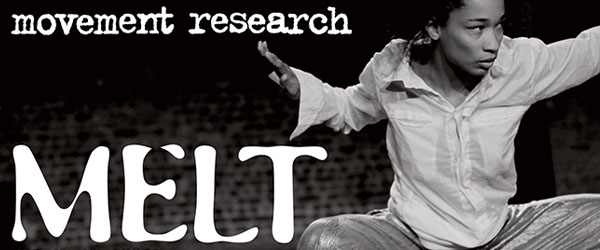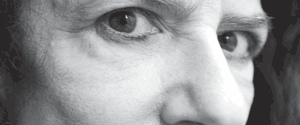Critical Correspondence
- Comments Off on MRPJ#29/Improvisation is Dead, Long Live Improvisation: Extras
- MRPJ Project
- 10.1.09
MRPJ#29/Improvisation is Dead, Long Live Improvisation: Extras
Arturo Vidich: …People have totally different ideas about similar ways of working. For instance, you say you view yourself from outside the body; Deborah [Hay] says position yourself 360 degrees around outside your body. It’s almost the same thing; it’s just how you word it, and what sort of practice you do. Deborah’s practice reconfigures the body into 73 trillion cells, each one has the potential to perceive the originality and uniqueness of all there is. I’ve also heard people say that everything is simply matter – tiny particles and immense space – move your matter.
Yvonne Meier: And I’ll just tell you to turn yourself into a pig and crumble – probably the same results. — from “Conversation between Arturo Vidich and Yvonne Meier”
Using the recent Movement Research Festival – “Improvisation is Hard” – as a departure point, Improvisation is Dead, Long Live Improvisation takes a look at the various approaches to improvisation both as a historical movement and as a current idea. This journal was edited by a team of artist/practicioners on the same model as the MR Spring Festival, to try to get more artist involvement in various aspects of MR’s programming. The editorial team, as they came to be called, consisted of April Biggs, Kimberly Brandt, Levi Gonzalez, Isabel Lewis, Alejandra Martorell and Layard Thompson. The Journal highlights a wide range of thoughts (often at odds with one another) on what can be considered improvisation, as the quotes here reflect, as well as a New York still feeling the effects of September 11 and the domestic politics of the Bush Administration.
As the curators of last winter’s Movement Research festival are acutely aware, improvisation is hard. Of course, it’s not so much that improv is hard; rather, improvisation is something of a lie, and we all know it. When we do improvisation, it is knowingly, under the terms of “improv;” we are anticipating unpredictability, training for it and setting it up. When coupled with such falsehoods as spontaneity or liberation, it’s easy to see that improvisation is simply the gesture, always necessarily arriving withing a series of gestures, which produces the illusion that we’re free and creative subjects, that we aren’t perpetually reproducing the history that precedes our movements, our speech, our acts of invention.
What’s “easy to see,” however, is not always the truth of a situation, and I don’t even pretend to bring clarity to a theory of improvisation. Because, despite what I noted above, it’s also true that improvisation is the only thing we really know how to do. And even if I often don’t believe in it, I must advocate for it wholeheartedly… Each instance of an act, as a new moment made extemporaneously… is what makes life worth living, what makes life at all. — from “As We Move Away from a Theory of Improvisation” by David Velasco
I experience myself often in the movement between arriving and departing. This has led me to be obsessed with transitions and the moment of transformation from one state to another. Transitional events hold/release potential energy as one state becomes dormant and the next is about to kick in. One never knows quite what’s coming but one’s being is in preparation for it. Paying attention to the transition forces me to be extremely present and not jump ahead to a preconceived idea of what is coming next. It allows me to be simultaneously aware of both the mundane experience of moving literally from one space to the other, and the metaphysical sense of transformation as I shift, for example, from the power of the image to the evolution of self in the performance. — from “Weathering the Score” by Jennifer Monson
I try to see as much as possible. Each event that I go to has an audience made up of growingly familiar faces. I see a clear and present community here and regardless of how naïve it may sound, somehow by sitting among them I feel like a part of it. The real pull of the dance world is that it exists as a shared experience. You are part of it simply by participating, and your participation is simultaneously creating and shaping it. Its nature depends upon its/your openness. — from “Beer is an interesting subject matter or notes on a collaborative process” by Beth Gill and Chase Granoff


